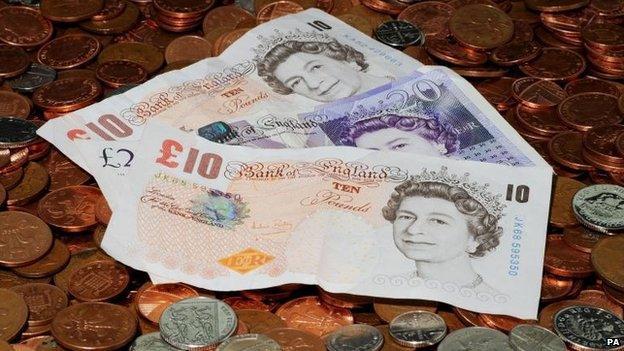End of UK's long living-standards squeeze?
- Published
- comments

For the first time in five years, pay excluding bonuses - so-called "regular" earnings - is rising faster than inflation.
Here is your statutory wealth warning: the rise in real pay has been for one month only (so far) and is so small as to create an almost imperceptible bulge in your wallet; pay rose by 1.3%, versus CPI inflation of 1.2%.
That said, the average pay rise in the private sector - where most people work, and where all the growth in employment is happening - was a bit better, at 1.6%.
But if none of that gets your pulses racing, the governor of the Bank of England thinks - at long last, you might say - that it won't be long before you are feel properly better off.
That said, he resisted my invitation to declare that the longest squeeze in British living standards in recorded history is now over.
Here are the Bank's encouraging forecasts.
In spite of serious weakness in the economies that buy from British businesses, especially the eurozone, the Bank expects growth in national income will slow only modestly in 2015 to 2.9% - compared with 3.5% this year.
More relevantly to most of us, it expects average weekly earnings will rise 3.25% next year and 3.75% the following year - compared with just 1.25% for the whole of 2014.
If that takes place, there should be a perceptible improvement in our sense of how well off we are - because the Bank expects that inflation will fall from 1.2% during the last three months of this year, to 1% in the first half of next year.
That improvement in our sense of well being won't be immense however: the Bank forecasts a rise of 1.25% in real post-tax household income next year and 2.5% the year after.
Falling inflation is probably a good thing, for now, so long as it does not turn into pernicious deflation, of the kind that deters us all from spending (it is human nature to defer purchases if we think we can buy more cheaply later).
Which is why the governor did not look too stressed when he said that he expects he will find himself writing one of those mildly embarrassing letters to the chancellor in coming months, to explain why inflation is significantly (more than 1%) lower than the 2% target.
Indeed inflation is expected to return to that target only after three years - because of the powerful disinflationary impact of lacklustre global growth and falling commodity prices.
Here is a funny peculiar thing.
The UK's lamentable productivity performance, which the Bank of England expects to continue for some years, is for now a good thing.
Because if wages rise faster than output per hour, as forecast by the Bank, then that would help inflation return to target: inflationary wage rises would offset the other deflationary pressures.
But - and there is a big but - we can't afford to pay ourselves more than we earn forever. Unless productivity starts to accelerate at some point, we'll be mired in living-standards stagnation.
And the big unspoken risk to the British economy, as it becomes more dependent on domestic demand to sustain the momentum of growth, is that an already unsustainably large deficit on the current account continues to widen - as we suck in imports.
Unless productivity were finally to improve, to make our exporters more competitive, those who finance that deficit might lose patience. And we could witness a phenomenon that would engender the wrong kind of nostalgia in those of a certain age: an old-fashioned sterling crisis.